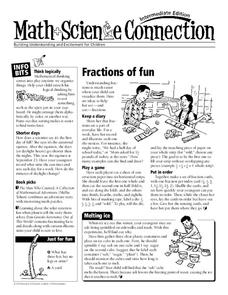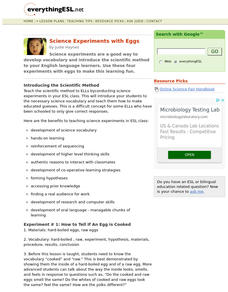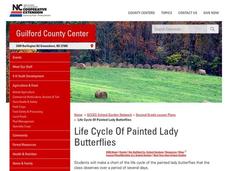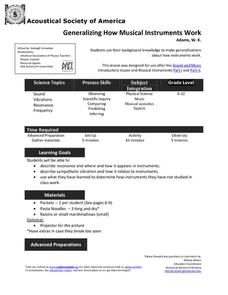Mascil Project
Molecular Gastronomy - Science in the Kitchen
Some say cooking is an art—and a science! Scholars scope out the savory subject of molecular gastronomy with a series of related activities. The teacher's guide contains printable worksheets and helpful tips for implementing the lesson.
Resources for Educators
Fractions of Fun
Reinforce concepts and encourage learner engagement with a collection of math games, science experiments, and cross curricular activities. In one fun resource, learners sort objects, keep a diary of everyday fractions, play a game using...
Curated OER
Science Experiment With Eggs
Students participate in four scientific experiments with eggs. They discuss egg vocabulary, and examine the eggs' attributes through the experiments. They focus on making educated guesses.
Discovery Education
Fuss About Dust
Dust is everywhere around us; it's unavoidable. But what exactly is dust and are certain locations dustier than others? These are the questions students try to answer in an interesting scientific investigation. Working independently or...
Berkshire Museum
Camouflage!: Collecting Data and Concealing Color
Help young scholars see the important role camouflage plays in the survival of animals with a fun science lesson. Starting with an outdoor activity, children take on the role of hungry birds as they search for worms represented by...
Curated OER
Fun With Food
Students participate in hands-on scientific experiments relying solely on household kitchen materials.
Signing Time Foundation
What is the Water Cycle?
Dive into an exploration of the water cycle cycle with this simple earth science lesson. After first discussing where rain comes from, young scientists define the terms condensation, evaporation, transpiration, and precipitation as a...
Michigan State University
Gases Matter
Young scientists learn that seeing isn't necessarily believing when it comes to the states of matter. After performing a fun class demonstration that models the difference between solids, liquids, and gases, children complete a series of...
Aquarium of the Pacific
States of Matter: Making Ice Cream
Who knew that learning about the states of matter could taste so sweet? This fun hands-on instructional activity captures the attention of learners as they use what they know about solids, liquids, and gases to create their very own...
Columbus City Schools
Biome Basics with a Disastrous Twist
Bored with your current biome bag of tricks? This bundle is a bountiful bag of biome fun! Travel the globe with seventh graders and explore the biotic and abiotic factors that define our world's biomes. Then, introduce a little chaos to...
Baylor College
Energy for Life (Energy from Food)
Energy comes in many forms, but how do living things get the energy they need to survive and thrive? In a simple, controlled experiment with yeast, water, and sugar, groups make observations about how yeast reacts with water alone, then...
American Chemical Society
All Wet
Sometimes liquids just don't get along together. A fun experiment has scholars determine whether various liquids dissolve in water. They pour isopropyl alcohol, vegetable oil, and corn syrup into cups of water to see which ones mix well...
North Carolina State University
Silly Stuff
It's time to get a little silly with this fun primary grade science activity. By simply combining two liquids, white glue and corn starch, a strange solid is formed, commonly known as silly putty. To ensure everything goes smoothly,...
National Wildlife Federation
Habitat Web
Young scientists weave together an understanding of ecosystems with this fun collaborative activity. Taking on the roles of different living and non-living elements of specific habitats, learners use a ball of yarn to create the web of...
Big Kid Science
Create a Milk Carton Camera to Observe the Eclipse!
Step aside, fancy glasses... it's time to create a solar eclipse viewing camera of your own using nothing more than a milk carton.
California Academy of Science
Fish Prints
What do a dead fish, conservation, and paint have in common? The answer is a great lesson about fish anatomy, fun print making techniques, and unsustainable fishing practices. The class will start by making fish prints with a...
Acoustical Society of America
Musical Instruments Part I - Woodwinds
What is the connection between sound and vibration? Learners find out as they conduct a series of experiments with instruments they create. The experiment is well explained, includes modifications for visuall and hearing impaired...
NC Cooperative Extension, Guilford County Center
Life Cycle Of Painted Lady Butterflies
The Very Hungry Caterpillar is the inspiration for this project-based learning activity. Kindergartners create a lifecycle chart for a butterfly with four sections: egg, caterpillar, pupa, and butterfly. It is a three-dimensional...
Pyro Innovations
Beach Exploration
Little ones will absolutely love this lesson. It's all about the beach and what they can find while sifting through the sand. A large bucket of sand filled with hidden items is brought into the classroom. Learners will discuss what kinds...
Acoustical Society of America
Generalizing How Musical Instruments Work
Sound, vibrations, resonance, and frequency are explored as learners use music to foster scientific inquiry. They engage in three different sound experiments and follow up discussions to foster a better understanding of how musical...
Polar Trec
Foraging for Fish in a Melting Arctic
How much do you know about the black guillemot of the Arctic region? With great background information, images, and a quick discussion, the class will learn all about the plight of the foraging seabird as they play a fun game. First,...
Star Date
Modeling the Night Sky
Dramatize the stars and planets as they become a visual representation of the solar system in this activity. Young astronomers track and simulate various constellations as they orbit the Earth to learn the position and motion of objects...
Berkshire Museum
Adopt a Schoolyard Tree
Help young scientists connect with nature and learn about trees with a fun life science lesson. Heading out into the school yard, children choose a tree to adopt, taking measurements, writing descriptions, and drawing sketches of it in...
Baylor College
Food for Kids
Immediately capture the attention of your class with the smell of freshly popped popcorn in the sixth lesson of this series on the needs of living things. Young scientists first use their senses to make and record observations of...

























